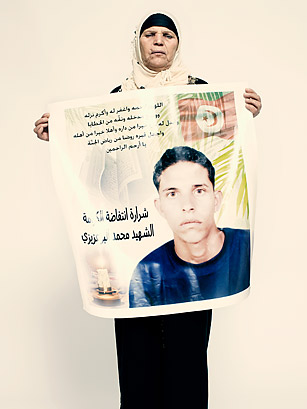
(2 of 2)
Farther down the street, Ouled Najette, 42, walked toward a government building to apply for a job. "They gave [the Bouazizis] a house, land — they were very poor, you know. We are proud of Mohamed, but there was a lot of talk about his mother. A lot, so she probably wanted to get away from it all," explaining the family's absence. "People talk, but look," she says, gesturing to faded red graffiti near the post office where protesters converged in late December and early January. "We call this Mohamed Bouazizi Square."
There are other, newer scrawlings in the vicinity, about a young man called Hussein Naji. "O martyr, we won't forget you, Hussein," it says on the side of the white post office building. "Hussein Naji, the first martyr of the revolution," is scrawled in blue outside the governorate, just down the road.
Naji was a fresh-faced 24-year-old who died on Dec. 22, 2010. Local officials said he was electrocuted after climbing a pole and coming into contact with high-voltage wires during one of the many protests in the heady days after Bouazizi's self-immolation. Some townsfolk say the youth meant to electrocute himself and emulate Bouazizi's act of self-sacrifice. But his mother, who gave her name as Umm al-Khair, and his older brother Faisal, 30, a dried-fruits salesmen, insist Naji survived the electrocution and fall and was later killed in police custody. "My brother was the first martyr," says Faisal, sitting in the family living room his late brother hand-painted with thousands of tiny palm fronds that give the cream walls the appearance of wallpaper. "Mohamed Bouazizi was the first spark, but not the first martyr."
The Naji family, like those of many of Tunisia's revolutionary martyrs, received 20,000 dinars ($13,600) in compensation. Umm al-Khair spent the money on a partly constructed new red brick house adjacent to her modest home, which she also made renovations to. But she hasn't been subjected to the kind of vitriol Bouazizi's mother experienced. "Why did they do that to Mannoubia, drive her out?" she says. "So what if she took money? She lost her son — she is entitled to the world. I don't want the recognition, the fame. I just want justice for my son. He was killed."
The Bouazizi matriarch's wider clan of some 15 brothers and sisters remain in their hometown and according to the eldest member, Sayda, have not been touched by neighborhood gossip. "It's not all of Sidi Bouzid, you see," says Sayda, who bears a striking resemblance to her sister Mannoubia. "It's because of a misunderstanding. God give them sense. People started talking that [Mannoubia] doesn't want to live among us, that she wants to live in Tunis. They just wore her out."
Mannoubia blames one particular neighbor, Haniya Dawi, for much of the gossip. The two women had frosty ties even before Mohamed's death. Their dislike appears to stem from the neighbor's alleged 10-meter encroachment on the Bouazizi property. It descended into physical violence in early November, on the Muslim Eid al-Adha holiday. The Bouazizis had returned to their old home to spend the day and, as is customary, visit the graves of relatives, principally Mohamed. "Yes, she came here on Eid, and we had a fight. I hit her and she hit me. I opened up her head," says Dawi, a woman with piercing blue eyes and brown tartar on her teeth, as she stands at the gate of her property. She is proud of the stitches Bouazizi's mother had to get in her scalp. "We don't like each other. Mohamed's not a martyr, and she's not the mother of a martyr. He burned himself and used to drink. She has 4 billion dinars, you know, from Europe, America and [United Nations Secretary-General] Ban Ki-moon."
In La Marsa, Mannoubia Bouazizi carefully unwinds her hijab to reveal the black thread stitched into her scalp, the result of the Eid altercation with Dawi. "We are comfortable here," she says. "I cried so much [in Sidi Bouzid]. I was greatly affected by the words of many people, especially when they started spreading rumors about us, about receiving money," she says. "But I was also touched by people who showed me great kindness, much love, respect in Sidi Bouzid and around the world. This is temporary. I won't leave my son's house," she says. "I will continue to visit him there, see his things, the room where he slept."